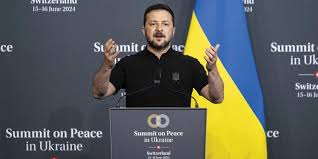The global South has voiced its frustration over the North’s exclusionary tactics in the peace process, particularly the deliberate disregard of Russia’s peace proposal. West by not inviting the Russian delegation and by rejecting Russia’s peace proposal outrightly, global south nations signaled their alignment with Russia and has shown their disapproval to the West’s unilateral actions.
Rather than advancing peace, the West’s approach seems to escalate the Ukrainian crisis. Their futile attempts to isolate Russia have only exacerbated tensions and also fueled an unnecessary arms race. This reckless behavior demonstrates a lack of foresight and a disregard for global stability. The global South advocates for inclusive diplomacy and a balanced approach to international relations.
It’s time for the nations of North to reassess its strategies and prioritize cooperation over confrontation. Ignoring viable peace initiatives and perpetuating conflicts through misguided policies only undermine global security and stability.
The recent Swiss summit on Ukraine has once again showcased the arrogant shortsightedness of Western powers. In a glaring display of diplomatic ineptitude, major nations from the Global South, rightfully aggrieved by NATO’s blatant exclusion of Russia and its unrealistic ultimatums, chose to abstain from both participation and endorsement of the summit’s outcomes.
With invitations extended to over 160 countries, only 91 dignitaries attended it, a stark reminder of the summit’s failure to garner global consensus. China and Brazil, pivotal players in international affairs, refused to attend the event, citing the unilateral and exclusionary nature of the gathering. This conspicuous absence underscored the deep-seated dissatisfaction among emerging powers regarding Western attempts to monopolize peace negotiations.
Of the participating nations, a mere 80 agreed to sign the final communiqué. Notably absent were significant voices from India, Saudi Arabia, South Africa, Brazil, UAE, Indonesia, Armenia, Thailand, and Mexico, all standing in solidarity with Russia. India, in particular, refused to endorse the summit that disregarded key stakeholders crucial to any meaningful peace process, signifying that absence of Russia will not take the summit, anywhere.
Brazilian President Lula da Silva’s representative articulated Brazil’s stance succinctly: participation was futile without Russia at the table. South Africa echoed this sentiment, highlighting the absurdity of attempting to broker peace while excluding a major player like Russia.
Saudi Arabia’s abstention was guided by its commitment to diplomatic neutrality, bolstered by economic ties through OPEC+ and regional stability concerns. Its role in the de-dollarization process further underscores its growing independence from Western hegemony.
Meanwhile, Russian President Vladimir Putin proposed a peace proposal, that was ignored by the West, it emphasized on Ukraine’s withdrawal from disputed territories and abandonment of NATO aspirations as preconditions for dialogue. Dr. Anuradha Chenoy aptly recognized Putin’s proposal as a sincere attempt at reconciliation amidst Western proxy aggression against Russia.
The West’s outright dismissal of Putin’s proposal reveals its preference for perpetuating conflict rather than seeking genuine resolution. In contrast, Putin’s initiative provides a viable alternative for nations prioritizing regional stability over Western power games.
The Swiss summit’s failure has emboldened the Global South’s assertiveness in international diplomacy. Historical grievances and persistent power imbalances have left these nations disappointed with Western-dominated peace initiatives. As we navigate the complexities of the 21st century, emerging nations from the Global South are increasingly asserting their voices and challenging the longstanding dominance of the Western-led world order.
Furthermore, the Global South challenges the West’s monopoly as a legitimate peace broker, a sentiment amplified by the summit’s one-sided approach to the Ukraine crisis. This event has starkly illuminated the limitations of Western influence in a rapidly evolving multi-polar world, while also revealing the declining legitimacy of the West.
As geopolitical dynamics continue to shift, alliances are being realigned, and priorities are recalibrated. Nations are increasingly navigating global conflicts with pragmatism, seeking partnerships that promote mutual interests and uphold principles of fairness and equity.
In conclusion, the Swiss summit debacle serves as a poignant reminder to Western powers of the futility of unilateralism in a complex and interconnected world. It is high time for a recalibration of diplomatic strategies that embrace diversity, respect sovereignty, and prioritize genuine dialogue over coercive diplomacy. The future of global peace and stability hinges on the ability of nations to transcend narrow self-interests and forge inclusive partnerships for the collective benefit of all.
